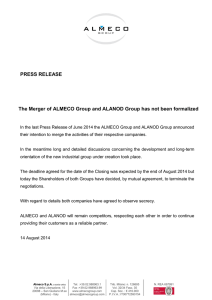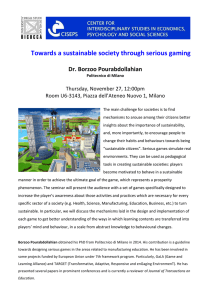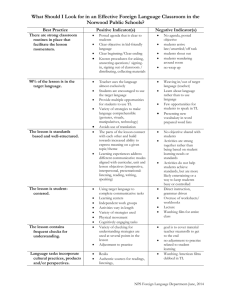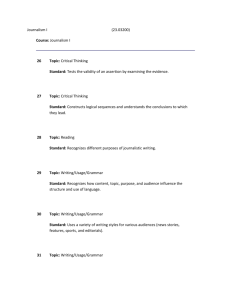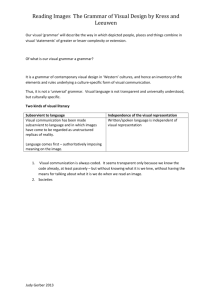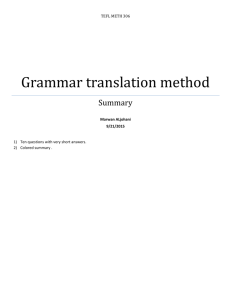scuola di economia e statistica english language 1 degree course
advertisement
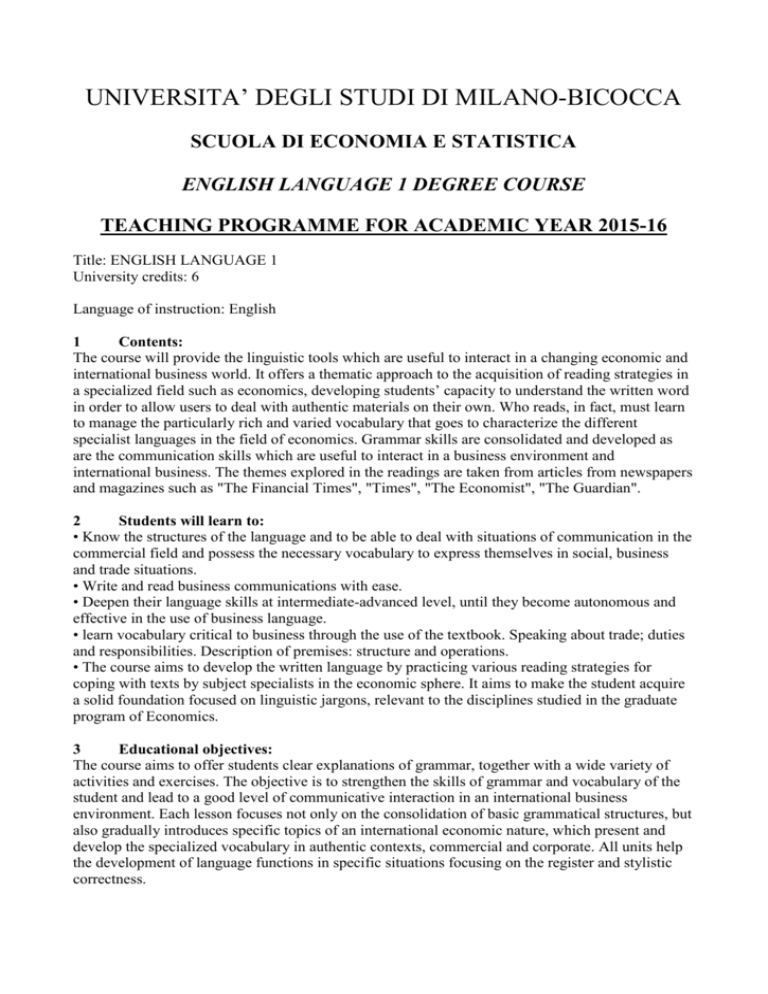
UNIVERSITA’ DEGLI STUDI DI MILANO-BICOCCA SCUOLA DI ECONOMIA E STATISTICA ENGLISH LANGUAGE 1 DEGREE COURSE TEACHING PROGRAMME FOR ACADEMIC YEAR 2015-16 Title: ENGLISH LANGUAGE 1 University credits: 6 Language of instruction: English 1 Contents: The course will provide the linguistic tools which are useful to interact in a changing economic and international business world. It offers a thematic approach to the acquisition of reading strategies in a specialized field such as economics, developing students’ capacity to understand the written word in order to allow users to deal with authentic materials on their own. Who reads, in fact, must learn to manage the particularly rich and varied vocabulary that goes to characterize the different specialist languages in the field of economics. Grammar skills are consolidated and developed as are the communication skills which are useful to interact in a business environment and international business. The themes explored in the readings are taken from articles from newspapers and magazines such as "The Financial Times", "Times", "The Economist", "The Guardian". 2 Students will learn to: • Know the structures of the language and to be able to deal with situations of communication in the commercial field and possess the necessary vocabulary to express themselves in social, business and trade situations. • Write and read business communications with ease. • Deepen their language skills at intermediate-advanced level, until they become autonomous and effective in the use of business language. • learn vocabulary critical to business through the use of the textbook. Speaking about trade; duties and responsibilities. Description of premises: structure and operations. • The course aims to develop the written language by practicing various reading strategies for coping with texts by subject specialists in the economic sphere. It aims to make the student acquire a solid foundation focused on linguistic jargons, relevant to the disciplines studied in the graduate program of Economics. 3 Educational objectives: The course aims to offer students clear explanations of grammar, together with a wide variety of activities and exercises. The objective is to strengthen the skills of grammar and vocabulary of the student and lead to a good level of communicative interaction in an international business environment. Each lesson focuses not only on the consolidation of basic grammatical structures, but also gradually introduces specific topics of an international economic nature, which present and develop the specialized vocabulary in authentic contexts, commercial and corporate. All units help the development of language functions in specific situations focusing on the register and stylistic correctness. 4 Communication skills Attention will be given to functional language communicative; exchange of verbal and written information, negotiating meetings, description of procedures and products, socializing with clients. It then focuses on the specific language of the business world: sales, IT, finance, investment, "international business" and market development. It uses material taken from authentic and updated publications in print (newspapers, weeklies, magazines and the internet). Learning skills The course offers the dual purpose of the revision and consolidation of basic language skills by putting them in the context of languages that characterize the various speciality areas of ‘Business. English’. 5 Extended programme: The participation of Italy in the context of world trade requires on the part of those who work in the business world a knowledge of languages and foreign cultures. Students are therefore expected to prepare very seriously in the linguistic field, dedicating the time necessary for the acquisition and / or improvement of skills of the English language. The course is designed to provide students with the language skills necessary to operate in the international world of business. The course offers a thematic approach to the acquisition of reading strategies in a specialized field such as the economy, developing the students capabilities in the written language in order to allow them to deal with authentic materials on their own. Who reads, in fact, must learn to manage the particularly rich and varied vocabulary that goes to characterize the different specialist languages in the field of economics. 6 Prerequisites: A required level A2/B1 to frequent the course. For students who have not yet reached that level, the English Department offers basic courses which prepare students to take the English 1 course, the following academic year. 7 Teaching methods: Lectures 8 Textbooks: 'Working with Economic and Business English – New Edition'; Robin Anderson. Maggioli Editore, 2015. ISBN: 978-88-916-1340-0 'New Images of Italy' P. Kennan, P. Tornaghi. Archipelago Edizioni 2011. 9 Assessment methods: The exam consists of a written test consists of two parts: 1 Part A - consists of 40 questions on grammar and specialized lexis / time 45 mins. * Students who do not pass Part A with a minimum of 20 correct answers out of 40 will be excluded from the correction of Part B. Thereby failing the exam. 2 Part B: reading comprehension of a text statement. Consists of 50 questions / time 75 mins. * The use of either bilingual or monolingual dictionary is not allowed. ** IMPORTANT; the successful completion of the ‘English Language 1’ course and exam is equivalent to level B2 (Common European Framework of Reference for Languages / Common European Framework of Reference for Languages) The English 1 language courses offered are: Degree course; ECOCOM is in the FIRST semester and the course comprises 8 hours a week of language study, divided in two parts: PART A - A REVISION OF ENGLISH GRAMMAR AND VERB FORMS FOR A TOTAL OF 4 HOURS PER WEEK FOR 12 WEEKS. OBLIGATORY TEXT: ‘Working with Economic and Business English – New Edition’, Robin Anderson. Maggioli Editore, Milano 2015. PART B -A READING SKILLS COURSE FOR A TOTAL OF 4 HOURS PER WEEK FOR 12 WEEKS. RECOMMENDED TEXT: ‘New Images of Italy’, Patricia Kennan, Paola Tornaghi. Arcipelago ed., Milano 2011. Degree course; ECOMARK is an ANNUAL course and the course comprises 4 hours a week of language study, divided in two parts: **************** PART A - A REVISION OF ENGLISH GRAMMAR AND VERB FORMS FOR A TOTAL OF 2 HOURS PER WEEK FOR 24 WEEKS. OBLIGATORY TEXT: ‘Working with Economic and Business English – New Edition’, Robin Anderson. Maggioli Editore, Milano 2015. PART B -A READING SKILLS COURSE FOR A TOTAL OF 2 HOURS PER WEEK FOR 24 WEEKS. RECOMMENDED TEXT: ‘New Images of Italy’, Patricia Kennan, Paola Tornaghi. Arcipelago ed., Milano 2011. Degree course; ECOAMM / ECOBAN is in the SECOND semester and the course comprises 8 hours a week of language study, divided in two parts: **************** PART A - A REVISION OF ENGLISH GRAMMAR AND VERB FORMS FOR A TOTAL OF 4 HOURS PER WEEK FOR 12 WEEKS. OBLIGATORY TEXT: ‘Working with Economic and Business English – New Edition’, Robin Anderson. Maggioli Editore, Milano 2015. PART B -A READING SKILLS COURSE FOR A TOTAL OF 4 HOURS PER WEEK FOR 12 WEEKS. RECOMMENDED TEXT: ‘New Images of Italy’, Patricia Kennan, Paola Tornaghi. Arcipelago ed., Milano 2011. ** The classes will be divided into either A-L or M-Z. Students must respect both the class’s degree course (ECOCOM, ECOMARK or ECOAMM/ECOBAN) and the division by surname A-L or M-Z.
